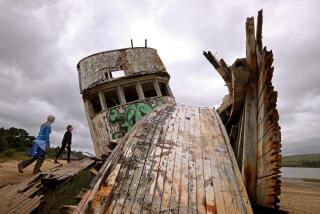Russians Lose Their Country on Way to New World : Three ships set out to trace Bering’s route to Alaska. But they are stranded by the breakup of the Soviet Union.
- Share via
SEATTLE — They set out to relive history and got snared in it.
Young Russian sailing enthusiasts, full of high-seas adventure and wanderlust, went to sea last June from the Soviet Union to retrace the voyage of North Pacific explorer Vitus Bering. Later, they were to go on, around South America, to represent their country in the 1992 regatta sailing the Caribbean in the 500-year-old wake of Christopher Columbus.
Their flotilla is composed of three colorful triple-masted packet sailing vessels, hewn of pine, 55 feet long and without a stabilizing keel beneath them. Except for their auxiliary engines, they are replicas of the ships Bering sailed in 1741 across the cold, wild sea that now bears his name to explore Russia’s future territory, Alaska.
These adventuring men and women were people of substance in the Soviet Union. They had cars at home and summer houses, and industrial and labor union sponsors underwrote their adventure with 1 million rubles.
That was last summer. Now, their country is gone; their remaining rubles will buy them nothing here, and the rattling Soviet diesels are falling apart, one of them dead and unsalvageable.
Today, after 5,500 miles, the expedition is grounded on the shoals by changing tides of history. The three ships and their remaining crew of 11--seven others have gone home--have been moored at a dock near downtown Seattle since Oct. 21. A wooden cask sits on the deck to hold donations from passersby.
“Our rubles are worth nothing. Please help. Peace,” reads a sign.
But hope has not dwindled aboard the St. Peter, St. Paul and St. Gabriel. Far from it. This, after all, is America, the land of opportunity, the crewmen say. It is the paradigm for the sweeping political and economic changes at home. And, here is a place that still stirs a free man’s imagination.
“When I was 13 years old and very ill in a hospital, my father gave me a book about a man who went around the world, a Czech . . . . I did not read that book, I ate , I ate it up. I decided then, I too will go around the world, whether by bicycle or boat or on my belly like a snake. And now 30 years later, here I am. I will do it,” says the leader of the expedition, Michael Poboronchook, a stout, bearded journalist and former teacher.
In response to Poboronchook’s determination and the audacity of his dream, Seattle-area sailors have conducted fund-raising efforts and stocked the expedition larders with canned food. The expedition artist has sold off his works to raise money for fuel. Waterfront businesses donated dock space.
And to help him search for a donor of a 60- to 100-horsepower diesel engine, Apple Computers gave Poboronchook a MacIntosh and printer on which to write letters, and US West provided him with a cellular telephone.
Meanwhile, university students studying Russian drop by to say hello and listen to the idiom of the sailors. Casual visitors who walk along the dock stop at the sight of the strange-looking square-rigged ship and are invited below for tea or maybe a slice of warm Russian bread and sweet jam.
“As a journalist, I have traveled. There are very many differences between Russians and the Japanese or other Asians, or between Russians and many Europeans. But we are the same, Russians and Americans,” says Poboronchook in slow but clear English. “We are friendly people; we like to dance and sing. We like to eat and drink and love. And we like to have a rest.”
But Poboronchook also has endured his frustrations with America. He sent 300 letters and faxes to would-be corporate donors. Only a few answered. How could they not even have the courtesy to tell him to get lost, he wonders. How can America be so impersonal?
Among the Russian crew is one stray American, 20-year-old Matthew Furminger of Akron, N.Y. He joined last fall when the expedition landed in Kodiak, Alaska. “The best moments of my life have been back there on the stern holding on to that log (tiller),” Furminger says.
During this layover in Seattle, Furminger is helping the crew learn English. Another crew member who can help with Spanish will be sought when the expedition reaches San Francisco or Los Angeles en route to South America.
And for that, they will have to leave soon, prepared as best they can.
Having already endured hell and high water enough for any mortal, Poboronchook has pronounced that he will set sail at the end of January for San Francisco. The expedition simply must meet up with the Columbus regatta. But this may require leaving behind the boat with the broken engine.
More to Read
Sign up for The Wild
We’ll help you find the best places to hike, bike and run, as well as the perfect silent spots for meditation and yoga.
You may occasionally receive promotional content from the Los Angeles Times.






